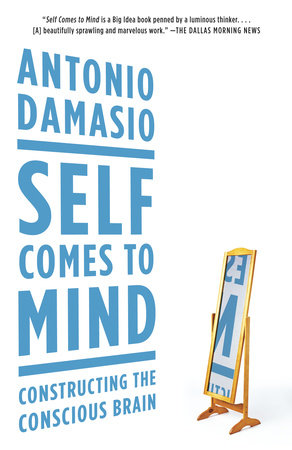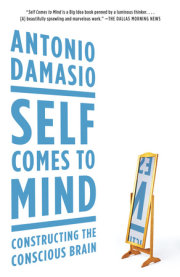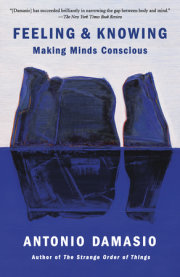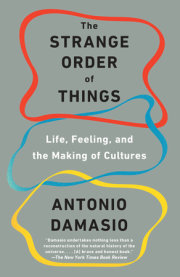1
Awakening
When I woke up, we were descending. I had been asleep long enough to miss the announcements about the landing and the weather. I had not been aware of myself or my surroundings. I had been unconscious.
Few things about our biology are as seemingly trivial as this commodity known as consciousness, the phenomenal ability that consists of having a mind equipped with an owner, a protagonist for one’s existence, a self inspecting the world inside and around, an agent seemingly ready for action.
Consciousness is not merely wakefulness. When I woke up, two brief paragraphs ago, I did not look around vacantly, taking in the sights and the sounds as if my awake mind belonged to no one. On the contrary, I knew, almost instantly, with little hesitation if any, without effort, that this was me, sitting on an airplane, my flying identity coming home to Los Angeles with a long to-do list before the day would be over, aware of an odd combination of travel fatigue and enthusiasm for what was ahead, curious about the runway we would be landing on, and attentive to the adjustments of engine power that were bringing us to earth. No doubt, being awake was indispensable to this state, but wakefulness was hardly its main feature. What was that main feature? The fact that the myriad contents displayed in my mind, regardless of how vivid or well ordered, connected with me, the proprietor of my mind, through invisible strings that brought those contents together in the forward-moving feast we call self; and, no less important, the fact that the connection was felt. There was a feelingness to the experience of the connected me.
Awakening meant having my temporarily absent mind returned, but with me in it, both property (the mind) and proprietor (me) accounted for. Awakening allowed me to reemerge and survey my mental domains, the sky-wide projection of a magic movie, part documentary and part fiction, otherwise known as the conscious human mind.
We all have free access to consciousness, bubbling so easily and abundantly in our minds that without hesitation or apprehension we let it be turned off every night when we go to sleep and allow it to return every morning when the alarm clock rings, at least 365 times a year, not counting naps. And yet few things about our beings are as remarkable, foundational, and seemingly mysterious as consciousness. Without consciousness—that is, a mind endowed with subjectivity—you would have no way of knowing that you exist, let alone know who you are and what you think. Had subjectivity not begun, even if very modestly at first, in living creatures far simpler than we are, memory and reasoning are not likely to have expanded in the prodigious way they did, and the evolutionary road for language and the elaborate human version of consciousness we now possess would not have been paved. Creativity would not have flourished. There would have been no song, no painting, and no literature. Love would never have been love, just sex. Friendship would have been mere cooperative convenience. Pain would never have become suffering—not a bad thing, come to think of it— but an equivocal advantage given that pleasure would not have become bliss either. Had subjectivity not made its radical appearance, there would have been no knowing and no one to take notice, and consequently there would have been no history of what creatures did through the ages, no culture at all.
Although I have not yet provided a working definition of consciousness, I hope I am leaving no doubt as to what it means not to have consciousness: in the absence of consciousness, the personal view is suspended; we do not know of our existence; and we do not know that anything else exists. If consciousness had not developed in the course of evolution and expanded to its human version, the humanity we are now familiar with, in all its frailty and strength, would never have developed either. One shudders to think that a simple turn not taken might have meant the loss of the biological alternatives that make us truly human. But then, how would we ever have found out that something was missing?
We take consciousness for granted because it is so available, so easy to use, so elegant in its daily disappearing and reappearing acts, and yet, when we think of it, scientists and nonscientists alike, we do puzzle. What is consciousness made of? Mind with a twist, it seems to me, since we cannot be conscious without having a mind to be conscious of. But what is mind made of? Does mind come from the air or from the body? Smart people say it comes from the brain, that it is in the brain, but that is not a satisfactory reply. How does the brain do mind?
The fact that no one sees the minds of others, conscious or not, is especially mysterious. We can observe their bodies and their actions, what they do or say or write, and we can make informed guesses about what they think. But we cannot observe their minds, and only we ourselves can observe ours, from the inside, and through a rather narrow window. The properties of minds, let alone conscious minds, appear to be so radically different from those of visible living matter that thoughtful folk wonder how one process (conscious minds working) meshes with the other process (physical cells living together in aggregates called tissues).
But to say that conscious minds are mysterious—and on the face of it they are—is different from saying that the mystery is insoluble. It is different from saying that we shall never be able to understand how a living organism endowed with a brain develops a conscious mind.
Copyright © 2010 by Antonio Damasio. All rights reserved. No part of this excerpt may be reproduced or reprinted without permission in writing from the publisher.










